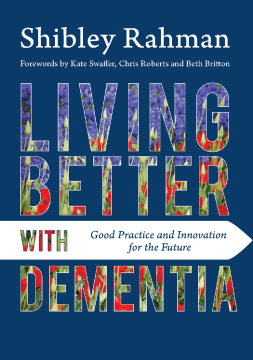
BOOK
Living Better with Dementia
Shibley Rahman | Kate Swaffer | Chris Roberts | Beth Britton
(2015)
Additional Information
Book Details
Abstract
What do national dementia strategies, constantly evolving policy and ongoing funding difficulties mean for people living well with dementia?
Adopting a broad and inclusive approach, Shibley Rahman presents a thorough critical analysis of existing dementia policy, and tackles head-on current and controversial topics at the forefront of public and political debate, such as diagnosis in primary care, access to services for marginalised groups, stigma and discrimination, integrated care, personal health budgets, personalised medicine and the use of GPS tracking. Drawing on a wealth of diverse research, and including voices from all reaches of the globe, he identifies current policy challenges for living well with dementia, and highlights pockets of innovation and good practice to inform practical solutions for living better with dementia in the future.
A unique and cohesive account of where dementia care practice and policy needs to head, and why, and how this can be achieved, this is crucial reading for dementia care professionals, service commissioners, public health officials and policy makers, as well as academics and students in these fields.
I commend Shibley for this valuable addition to the current thinking and discussion on what it is to live with dementia. This text builds quite significantly on his original work and continues to challenge professionals on issues of importance for families affected by dementia. I find his frank and open style refreshing, unreserved in his willingness to question both the semantics used in practice and assumptions that are too easily made on what it might be like to live with dementia.
Karen Harrison Dening, Director of Admiral Nursing, Dementia UK
This is a well-written, extensively researched, easy to read and important book for anyone interested or working with dementia.
Fenella Lemonsky
Mental Healthy Today
This book is informative and challenging in equal measure. It not only provides a thorough analysis of the issues currently facing dementia care, but it also offers a refreshing and thoughtful critique of the many challenges. Each chapter carefully combines research evidence, practice issues and policy influences, and contextualises these within the experience of those living with dementia, including their carers.
Whilst this book is complex and thought-provoking - I believe it is a highly welcome counterbalance to current thinking on how to improve the lives of all those who are affected by dementia. It will force the reader to challenge their own thinking about dementia, not just as an illness but as a social construct, and as such I would highly recommend it.
Rachel Thompson, Professional & Practice Development Lead for Admiral Nursing, Dementia UK
A unique and cohesive account of where dementia care practice and policy needs to head, and why, and how this can be achieved, this is crucial reading for dementia care professionals, service commissioners, public health officials and policy makers, as well as academics and students in these fields.
StudentNurse.net
This is a well-written, extensively researched, easy to read and important book for anyone interested or working with dementia.
Rating: Highly recommended.
Fenella Lemonsky, mental health service user researcher, Mental Health Today
This new book is an immaculately researched guide to living with dementia in England in the 21st century, covering the subject from policy to lived experience, but always with consideration and compassion. There is no better introduction to the challenges and complexities that dementia brings to individuals, families and society.
Geoff Huggins, Director of Health and Social Care Integration, Scottish Government
I would highly recommend this book to anyone who is interested or has contact with people living with dementia.
A particular strength of this book is the connection of policy to practice and practical implications. There are a number of examples where good practice can help to inform practical solutions for the future, making this a book that has value and use on many levels. A further asset is the conclusion chapter. This excellent summary draws everything together from the previous chapters under key themes and really helps to pull this book together.
I would highly recommend this book to anyone who is interested or has contact with people living with dementia; health and social care professionals, public health workers, service commissioners and researchers and students in this field. This is also a book that would be useful to members of the general public as well.
Lynne Partington, head of research, Evaluation and Technology, The End of Life Partnership, Cheshire
Nursing Times
I congratulate Shibley on writing a book that brings together so many of the challenges facing people who are living with dementia, their families, and professionals from many different disciplines, and takes them forward in a critically thoughtful way. This is a book that truly points the way to a future where living better is a reality for everyone affected by dementia.
Beth Britton, Freelance Campaigner, Consultant, Writer and Blogger
Shibley Rahman follows his first brilliant book on dementia with this fascinating publication, containing insight and empathy in equal measure. This book will help readers - health professionals and the public alike - to understand people in their lives with dementia, guiding you through everything you ever wanted to know about dementia and could possibly want to ask. Shibley guides you through the challenges of caring for people and living with dementia. He doesn't shy away from the topics that are uncomfortable, but he also gives space to examples of good living and practice that leave the reader with hope and positivity.
Jenni Middleton, editor, Nursing Times
Shibley Rahman graduated in neuroscience and medicine from Cambridge University. There he also completed his PhD in frontotemporal dementia, commencing a lifelong interest in the timely diagnosis of dementia. He also trained to postgraduate level in medicine, law and business. Shibley speaks regularly about dementia diagnosis and post-diagnostic care, researches wellbeing and advocates rights-based approaches.
